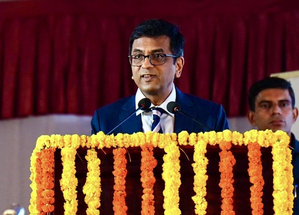Climate change can no longer be ignored: CJI
New Delhi, July 2 (IANS/WISHAVWARTA) Stressing to incorporate a green lifestyle into daily lives, Chief Justice of India (CJI) D.Y. Chandrachud on Tuesday said that climate change can no longer be ignored. Speaking at the occasion of laying the foundation stone of new buildings at Delhi’s Karkardooma, Shastri Park and Rohini, CJI Chandrachud referred to the two heatwaves followed by the recent record-breaking rain in a single day in the national capital. “This year Delhi experienced the hottest recorded weather. Our infrastructure must reflect the reality we live in – Climate change can no longer be ignored. One crucial step is to incorporate a green lifestyle into our daily lives, which includes reducing carbon emissions,” he said. The CJI said he was delighted to know that these new GRIHA-rated court buildings will focus on heat island mitigation and reduce environmental footprint. Green Rated Integrated Habitat Assessment (GRIHA) — a rating tool that helps people assess the performance of their building against certain nationally acceptable environmental benchmarks. He said, “Court premises like all buildings are not just made of bricks and concrete. They are made up of hope. Courts are made to realise the virtues of justice and the rule of law. Every case that is being filed before us, is with that hope for justice. When we invest in the safety, accessibility and comfort of our judges, lawyers and litigants, we build more than just an efficient system — we make a just and inclusive system.” He said that the new court complexes would enhance the efficiency of the court, alleviate case backlogs and provide a dignified environment to all stakeholders. Further, CJI Chandrachud said that the judicial system subserves no might but the Constitution and is in service of no one but the litigants, adding that our courts are not merely sights of sovereign power but are also essential public service providers. “I am hopeful that the new additions to the courts will embrace its rich legacy and create futuristic courts to enhance efficiency and uphold justice,” he said in conclusion. –






















